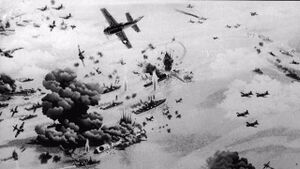Battle of the Straits: Difference between revisions
(Created page with "{{Infobox military conflict | conflict = Battle of the Straits | image = AlbHist10.jpeg | caption = Albrennian carrier aircraft engage the Songhan carrier ''Ladja...") |
m (Categorisation) |
||
| Line 62: | Line 62: | ||
==Memorials== | ==Memorials== | ||
[[Category:Levilion]] | [[Category:History (Levilion)]] | ||
Revision as of 01:50, 3 September 2020
| Battle of the Straits | |||||||
|---|---|---|---|---|---|---|---|
| Part of the Second Great War | |||||||
 Albrennian carrier aircraft engage the Songhan carrier Ladjap and its escorts. | |||||||
| |||||||
| Belligerents | |||||||
|
|
| ||||||
| Commanders and leaders | |||||||
|
|
| ||||||
| Units involved | |||||||
|
|
| ||||||
| Strength | |||||||
|
~220 ships in total 10 fleet carriers 8 light carriers 7 battleships 30 cruisers 120 destroyers 45 submarines About 1,500 aircraft |
~189 ships in total 7 fleet carriers 9 light carriers 14 battleships 22 cruisers 105 destroyers 32 submarines About 970 aircraft | ||||||
| Casualties and losses | |||||||
|
~3,000 casualties; 1 light carriers, 1 battleship, 4 destroyers ~200 aircraft |
~15,500 casualties; 5 fleet carriers, 3 light carriers 6 battleships, 10 cruisers, 21 destroyers sunk ~450 aicraft | ||||||
The Battle of the Straits was the largest naval battle of the Second Great War and the largest naval battle in history, with over 400 ships and 180,000 naval personnel involved. It was fought in and around the Eastern Straits of Qes from 23-25 October 1942, between Songhese naval forces and the Albrennian Fleet, which was supported by Audonian, Amand, Senegorese, and Blaykish land forces. The battle's objective was to open the Eastern Straits of Qes, allow Coalition forces access to the Sea of Qes, and pave the way for an invasion of the Songhese mainland.
By the time of the battle, the Songhese Navy had been badly damaged at the Battle of Saint-Baptiste and expelled from Blaykish Mesonesia, and its total strength stood well below not only that of the Coalition navies combined, but also below that of the Albrennian Fleet alone. It rallied almost all of its remaining vessels in an attempt to hold the straits, but was defeated by the Fleet of the Commonwealth, Albrennia's main naval force in the Demontean. The Songhese Navy suffered such catastrophic losses in the battle that it was not able to mount another major operation for the rest of the war.
The battle consisted of three major engagements. On 23 October, Coalition land forces - supported by Albrennian air and naval power - crossed the Eastern Straits of Qes and seized Fort Yungai, securing Songhese heavy artillery positions on both sides of the strait. On 24 October, Albrennian naval forces moved into the Straits in force under cover of Coalition artillery on both shores and Fleet carrier aircraft. Despite inflicting heavy casualties on the Songhese Navy, the Albrennians were eventually forced to retreat toward the eastern end of the Straits, leaving the 34 vessels of Task Force 21 surrounded by Songhese forces at the western end of the Straits. However, seven hours of continuous carrier air attack and artillery bombardment inflicted devastating losses on the Songhese Navy, leaving them unable either to expel the Albrennians from the Straits or to escape to the east without further exposing themselves to attack. During the night of 24-25 October, the remains of the Songhese Combined Home Fleet broke out to the east, into the Sea of Qes, while under continuous air attack. On 25 October, the Albrennian Fleet caught and destroyed most of these survivors at the Battle of Grey Reef.
The battle demonstrated conclusively the superiority of modern carrier airpower and radar targeting over traditional naval tactics based around the big-gun battleship. It established the Albrennian Fleet as the greatest naval power in the Sea of Qes, a status it would retain for the rest of the Second Great War, and paved the way for Coalition amphibious assaults on the Songhese homeland. It remains taught in naval academies across Levilion, and the battle is a major point of national pride in Albrennia, and to a lesser extent in Audonia, Amandine, and Senejor.